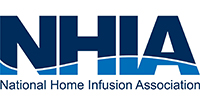Associations Call for Expanded Infusion Regulation
The NHIA and several other organizations urged the FDA and state regulatory agencies to investigate and regulate direct access infusion businesses to protect supplies and patients.
- By David Kopf
- Jan 20, 2022
 Aiming to protect intravenous supplies and patients, the National Home Infusion Association (NHIA) and allied organizations urged the FDA and state boards of pharmacy to investigate, regulate and license currently unregulated direct access infusion businesses providing intravenous services without the recommendation of a licensed prescriber.
Aiming to protect intravenous supplies and patients, the National Home Infusion Association (NHIA) and allied organizations urged the FDA and state boards of pharmacy to investigate, regulate and license currently unregulated direct access infusion businesses providing intravenous services without the recommendation of a licensed prescriber.
In addition to the NHIA, the American Society of Health-System Pharmacists (ASHP), National Association for Home Care and Hospice (NAHC), American Society for Parenteral and Enteral Nutrition (ASPEN), National Infusion Center Association (NICA), and Infusion Nurses Society (INS) signed a statement that was sent to the FDA and the state regulatory agencies.
The statement can be downloaded as a PDF here.
The statement asks regulators to do two main things: assess direct access infusion businesses’ impact on critical drug shortages, and for states to regulate such businesses in the same way as medical, pharmacy, and home health providers to reduce shortages of critical parenteral products, ensure safety, and protect the public.
Primary Problems
The statement says that the unregulated direct access businesses promote IV services to the general public without a medical assessment or prescriber order to address issues such as hangovers, exercise recovery, and elevation sickness, which can usually be resolved with oral medications or other non-IV treatment means. As a result, the statement argues these services are diverting scarce resources—many of which appear on the FDA’s drug shortage list—from patients who have legitimate medical needs.
Also, because the clinics operate on a cash basis rather than through medical insurance plans, they often don’t need to meet licensure and other requirements that are prerequisites for traditional providers of pharmacy, home health nursing, and medical services. Those prerequisites include maintaining independent accreditation, ensuring staff competency, sterile drug preparation and administration, infection control, record keeping, and more.
Proposed Solutions
The statement’s signatory organization recommended the following:
- Investigate and assess the extent to which direct access infusion businesses are contributing to the ongoing national shortages of parenteral drugs, nutrition components, and diluents/solutions.
- Require all businesses that sell direct access infusion therapies to the general public to comply with licensure and regulations applicable to the services offered.
- Investigate claims of health benefit, treatment, or cure, and require businesses that sell direct access infusion therapies to disclose the lack of evidence and unique risks of administering compounded IV products that are not medically necessary.
- Establish a licensure category for businesses that sell direct access infusions.
“As organizations invested in the safe and effective administration of infused medications to patients with acute and chronic medical conditions, we are highly devoted to ensuring the availability of these products and their safe administration to patients with legitimate medical needs,” said Connie Sullivan, BSPharm, NHIA’s president and CEO. “In addition, as health care professionals, we approach patient care with the imperative to first do no harm. Unlicensed and unregulated businesses administering medically unnecessary therapies with no adherence to industry and professional standards introduces unwarranted risks. We urge state regulatory agencies and the FDA to assess the impact of these operations and establish an appropriate licensing requirement.”
About the Author
David Kopf is the Publisher HME Business, DME Pharmacy and Mobility Management magazines. He was Executive Editor of HME Business and DME Pharmacy from 2008 to 2023. Follow him on LinkedIn at linkedin.com/in/dkopf/ and on Twitter at @postacutenews.